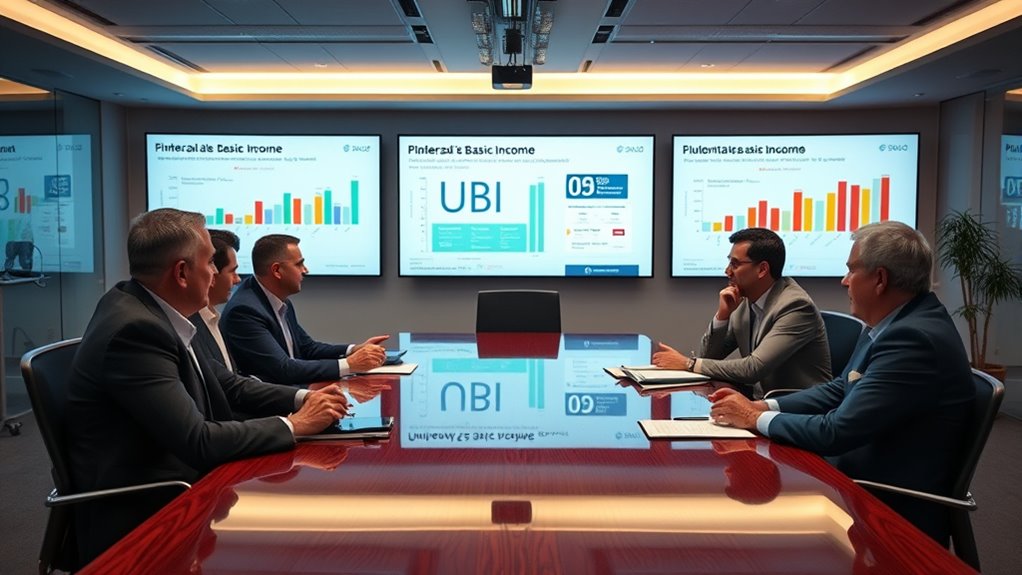Tech CEOs are backing UBI because they see automation and AI disrupting traditional jobs and economic stability. They believe UBI can address income inequality, support people during job transitions, and promote innovation by providing financial security. Leaders like Elon Musk and Sam Altman argue that UBI is essential for society’s resilience amid rapid technological changes. If you explore further, you’ll discover how their support could shape the future of work and society.
Key Takeaways
- Silicon Valley leaders see UBI as a solution to job displacement caused by automation and AI advancements.
- UBI promotes economic stability, reduces poverty, and supports consumer spending amid technological disruptions.
- Tech CEOs believe UBI encourages innovation, entrepreneurship, and risk-taking by providing financial security.
- Industry leaders support UBI to maintain societal trust and resilience during rapid economic and societal changes.
- Backing UBI aligns with the goal of creating a fairer, more adaptable economy in the face of automation challenges.
Silicon Valley’s Growing Support for Universal Basic Income
Have you noticed how more tech leaders in Silicon Valley are openly supporting Universal Basic Income (UBI)? They see it as a practical solution to economic challenges, especially in high-cost areas like Silicon Valley. Community studies and local organizations highlight how UBI reduces financial hardship for families, giving them more stability. Initiatives funded by figures like OpenAI’s CEO Sam Altman explore UBI’s impact on workforce participation and financial security. Research shows that UBI improves financial flexibility without discouraging work, and it helps move households into income adequacy. It’s also linked to better health outcomes and increased job-seeking behavior. These benefits create a compelling case for UBI as a tool to address poverty, economic insecurity, and inequality within the tech community and beyond. Supporting evidence from local pilot programs and research demonstrates that UBI can be a sustainable part of economic policy, especially as communities and governments seek innovative ways to support their residents.
Automation and AI: Catalysts for UBI Adoption

Automation and AI continue to advance rapidly, and their impact on the job market becomes increasingly significant. You can imagine a future where:
- Thousands of low-skilled jobs are replaced by machines and algorithms.
- Workers feel uncertain about job security as technology evolves.
- Wealth becomes concentrated among those owning automation tools.
- Society faces rising economic inequality and social disruptions.
These changes drive policymakers and tech leaders to see UBI as a crucial solution. It offers a safety net amid job displacement, helps reduce poverty, and ensures basic needs are met. Additionally, economic inequality is expected to widen if proactive measures are not taken. As automation reduces the need for human labor, the importance of wealth redistribution becomes more evident. With over 160 UBI pilots worldwide, evidence shows that basic income can improve health, education, and overall wellbeing. Research indicates that UBI can lead to increased civic engagement and trust in institutions. Moreover, the increasing adoption of digital currencies and financial technology can facilitate more efficient distribution of universal basic income. Automation and AI act as catalysts, pushing UBI into the mainstream as a way to balance technological progress with human welfare. Recognizing the potential of public support systems, many experts advocate for integrating UBI with existing social safety nets to maximize effectiveness. An understanding of economic and social impacts is essential for crafting policies that ensure equitable benefits for all.
Key Figures and Their Contributions to UBI Initiatives

Silicon Valley’s influential tech leaders play a pivotal role in shaping UBI initiatives, often using their platforms to advocate for basic income as a solution to automation-driven job losses. Elon Musk emphasizes UBI’s role in maintaining economic stability amid AI advancements. Vinod Khosla predicts widespread job replacement by AI and sees UBI as a way to mitigate economic impacts. Sam Altman advocates for UBI to ensure social stability during technological upheaval. Marc Andreessen suggests UBI could simplify social welfare, though critics see potential benefits primarily for the tech elite. Many industry leaders support UBI, citing its potential to stabilize consumer demand and society as automation accelerates. Their backing influences public discourse and policy debates around UBI’s future. Additionally, the growing awareness of automation and its effects on employment has further fueled support for universal basic income as a strategic response to the rapidly changing job landscape. Recognizing the importance of social safety nets, these leaders often highlight UBI as a modern solution to emerging economic challenges. For example, understanding the benefits of natural and organic juices can inspire innovative ways to fund or support social programs like UBI through sustainable practices. Moreover, the increasing focus on sustainable practices aligns with broader efforts to create resilient and eco-friendly social support systems, which may include green investment initiatives to fund social safety measures.
The Rationale Behind Tech Leaders’ Endorsement

You can see that tech leaders support UBI because they recognize automation will displace many jobs, threatening economic stability. They also believe that providing a safety net encourages innovation and creative pursuits beyond traditional work. By endorsing UBI, they aim to address these shifts while fostering a more resilient and dynamic society. Support from notable entrepreneurs underscores the growing legitimacy of UBI as a solution to technological disruption. Additionally, advocates emphasize the importance of decluttering as a means to create space for new ideas and opportunities in a rapidly changing economic landscape. Incorporating innovative home organization solutions can help communities adapt to these economic transformations and promote overall well-being. Moreover, understanding the role of AI security and maintaining trustworthiness in emerging technologies is crucial for ensuring that innovations like UBI are implemented safely and effectively. Recognizing the significance of technological adaptation is essential for shaping policies that support a smooth transition into this new economic era. Leveraging digital infrastructure can further facilitate these transitions and ensure equitable access to new opportunities.
Addressing Automation Displacement
Tech leaders endorse Universal Basic Income (UBI) because they recognize that automation is rapidly displacing millions of jobs, creating economic insecurity for workers. As more tasks are performed by machines, your job security becomes uncertain. Automation is expected to:
- Displace 85 million jobs globally by 2025, with 14% of workers already affected
- Replace over 41% of jobs in the next five years, including roles in energy, utilities, and mining
- Lead to strategic workforce reductions, with companies planning long-term staff cuts using AI
- Drive increased productivity, but also create significant challenges for workers needing new skills
- The impact of AI on employment is more restrained than initial projections, with societal and economic challenges extending beyond job displacement. Furthermore, societal adaptation will be crucial to managing this transition.
With AI-driven customer service, industrial robots, and autonomous systems expanding, your employment landscape is shifting. Tech leaders see UBI as a essential safeguard amid this automation-driven upheaval.
Promoting Economic Stability
Support for Universal Basic Income (UBI) among tech leaders is driven by its potential to promote economic stability. UBI helps reduce poverty by covering essentials like housing and groceries, ensuring basic needs are met. It also addresses income inequality, fostering a fairer economy. Regular cash payments can ease financial stress, improving overall financial well-being. By boosting consumer spending, UBI stimulates economic activity and growth. It simplifies complex welfare systems into a single, unconditional payment, reducing administrative burdens. Additionally, UBI offers a safety net that makes individuals more resilient to economic shocks, like job losses or crises. Economic resilience is increasingly important as automation and AI-driven efficiencies are increasing the likelihood of job cuts in multiple sectors, further emphasizing the need for a safety net. Developing AI and automation technologies can contribute to economic stability by creating new opportunities and supporting innovation. Recognizing the importance of social safety nets helps ensure that technological progress benefits society as a whole. These benefits collectively help maintain societal stability, making UBI an attractive tool for tech leaders seeking long-term economic security in an evolving landscape.
Encouraging Innovation and Creativity
Because financial insecurity often hampers creative pursuits, providing a stable income through UBI can substantially encourage innovation and experimentation. When you’re assured of basic needs, you’re more likely to explore new ideas, start small businesses, or invest in education. UBI reduces the fear of total loss, making it easier to take risks. Imagine:
- Having a safety net that lets you try new ventures without constant worry
- Gaining the freedom to focus on artistic or technological projects
- Feeling empowered to take intellectual risks leading to breakthroughs
- Accessing more diverse opportunities, especially for marginalized groups
With this financial security, you can dedicate time and energy to creative pursuits, fueling innovation that benefits society as a whole. Research shows UBI creates an environment where experimentation and inventive thinking thrive.
Evidence From Pilot Projects and Experiments

You can see from pilot projects that unconditional cash payments boost income stability, housing, and employment for vulnerable groups. These experiments also give recipients the financial flexibility to make choices that suit their needs. While results vary, many programs report improved well-being without reducing work effort. Additionally, pilot programs like Silicon Valley’s support that these payments can lead to measurable improvements in health and stability. Furthermore, the positive outcomes observed highlight the importance of understanding tax implications for recipients and policymakers alike. Recognizing the public perception of basic income can influence its broader adoption and success. Moreover, integrating retail hours awareness can help ensure that support services remain accessible during program implementation.
Pilot Program Results
Pilot programs around the world and across the United States provide compelling evidence of UBI’s potential benefits and feasibility. These pilots show how cash transfers improve daily life and well-being. Imagine:
- Households spending most of their income on food, healthcare, and basic needs.
- Higher-income recipients saving money or making discretionary purchases.
- Families using funds to boost children’s education and nutrition.
- Recipients in Baltimore and Ithaca allocating money for rent, utilities, and groceries.
Data reveals reduced food insecurity, better mental and physical health, and lower stress levels. Many participants report feeling more secure and motivated, with some even starting small businesses. These results demonstrate that UBI pilots can foster economic stability and social well-being effectively.
Impact on Work Effort
Evidence from pilot projects shows that implementing UBI often leads to a reduction in work hours among recipients, as the financial security it provides lessens the immediate need to work full-time. You might find that people choose to work fewer hours or shift to more meaningful or creative pursuits. Responses to UBI vary based on individual circumstances and benefit levels, with some sectors experiencing more noticeable declines in labor participation. While some recipients work less, others use the support to shift into better jobs or start businesses, potentially boosting productivity in the long run. Overall, UBI can influence work effort by offering greater flexibility, encouraging entrepreneurship, and supporting personal growth, though the specific effects depend on program design and economic context.
Societal Benefits and Economic Arguments

Universal Basic Income (UBI) offers compelling societal and economic benefits that can transform communities and improve overall well-being. Imagine a society where poverty drops drastically, and incomes rise steadily, providing everyone with a safety net. Picture healthier populations experiencing fewer stress-related illnesses, better access to healthcare, and improved mental health. Envision children excelling academically because families aren’t overwhelmed by financial worries, leading to better long-term prospects. Consider a resilient economy where consumer demand remains stable during downturns, boosting local businesses and economic growth. UBI also helps bridge the inequality gap, creating social cohesion by ensuring everyone has a financial floor. This all-encompassing support not only fosters individual stability but also cultivates a stronger, more equitable society.
Addressing Concerns and Criticisms From the Tech Community

While advocates highlight UBI’s potential to streamline social safety nets and reduce bureaucracy, skeptics raise valid concerns about its affordability and long-term sustainability. You should consider the high costs, which could run into trillions annually, raising questions about funding sources like higher taxes or cuts to other programs. Some research suggests that affordable UBI might not be enough to considerably reduce poverty, and pilot studies often lack the scope to test long-term effects. Critics also warn that integrating UBI with existing benefits could cause overlaps, inefficiencies, or even threaten crucial services if UBI replaces current safety nets. Additionally, while tech leaders focus on reducing bureaucracy, the practical challenges of funding and administration remain uncertain, fueling ongoing debate about UBI’s feasibility.
The Broader Implications for Future Work and Society

As AI and automation continue to advance, they are likely to displace up to 30% of current work hours by 2030, making UBI an essential safety net for workers facing job disruptions. This shift could reshape society in several ways. You might see:
- A smoother progression to new jobs, as UBI provides time and resources for retraining.
- Reduced poverty and income inequality, creating a more equal social fabric.
- Enhanced health and education outcomes, as financial stability supports well-being and personal growth.
- Increased trust in economic systems, as UBI offers a reliable safety net amid rapid technological change.
These changes could foster a more adaptable, resilient society where work becomes more flexible and inclusive, with UBI helping to manage inevitable technological disruptions.
Frequently Asked Questions
How Do Silicon Valley Leaders Plan to Fund Widespread UBI Programs?
You might wonder how Silicon Valley leaders plan to fund widespread UBI programs. They propose using profits from automation and AI, taxing companies benefiting from automation, and forming public-private partnerships. Some suggest redistributing wealth from top earners and large firms. Additionally, they highlight efficiency gains from UBI reducing bureaucracy. However, funding sustainability, political resistance, and economic instability remain challenges to these strategies.
What Are the Long-Term Societal Impacts of Implementing UBI at Scale?
When you consider the long-term societal impacts of scaling UBI, you might see improved financial stability, reduced poverty, and better health outcomes. It can foster greater social participation, education, and entrepreneurial efforts. However, you should also be aware of potential challenges like housing affordability, regional disparities, and political shifts that could influence program sustainability. Overall, UBI has the potential to reshape societal safety nets and promote more equitable communities if implemented thoughtfully.
Could UBI Inadvertently Increase Economic Inequality or Dependence?
Did you know that in some studies, UBI recipients show increased entrepreneurial activity? But, you might wonder if UBI could unintentionally widen inequality or create dependence. It’s possible—if benefits aren’t well-targeted or funded, some could rely too much on support, reducing motivation to work. Proper design and implementation are key to avoiding these pitfalls, ensuring UBI promotes equality and independence rather than dependence and disparity.
How Does UBI Compare to Traditional Welfare Programs in Effectiveness?
When comparing UBI to traditional welfare programs, you’ll find UBI offers simplicity and efficiency, reducing bureaucracy and administrative costs. It guarantees a steady income, helping you and others escape poverty and financial stress. Unlike targeted welfare, UBI doesn’t penalize work or create barriers, fostering greater economic security. While it’s less selective, UBI’s universality guarantees broader coverage, potentially making it more effective at reducing poverty and supporting long-term stability.
What Ethical Considerations Are Involved in Tech-Driven UBI Initiatives?
Think of UBI as a safety net woven with threads of fairness, dignity, and societal responsibility. As you consider the ethics, you realize it’s about valuing people beyond work, addressing inequality, and recognizing shared public resources. You face questions of funding, governance, and cultural shifts—ensuring UBI uplifts without reinforcing power imbalances. Ultimately, it’s a moral choice to create a society where everyone’s worth is recognized, not just their productivity.
Conclusion
As you consider the surge of support from Silicon Valley, note that over 40 U.S. pilot programs have shown promising results, with many reporting increased well-being and economic stability. Tech leaders see universal basic income as a way to prepare society for rapid automation and AI advancements. Embracing UBI isn’t just about innovation; it’s about shaping a resilient future where technological progress benefits everyone, not just the few.









